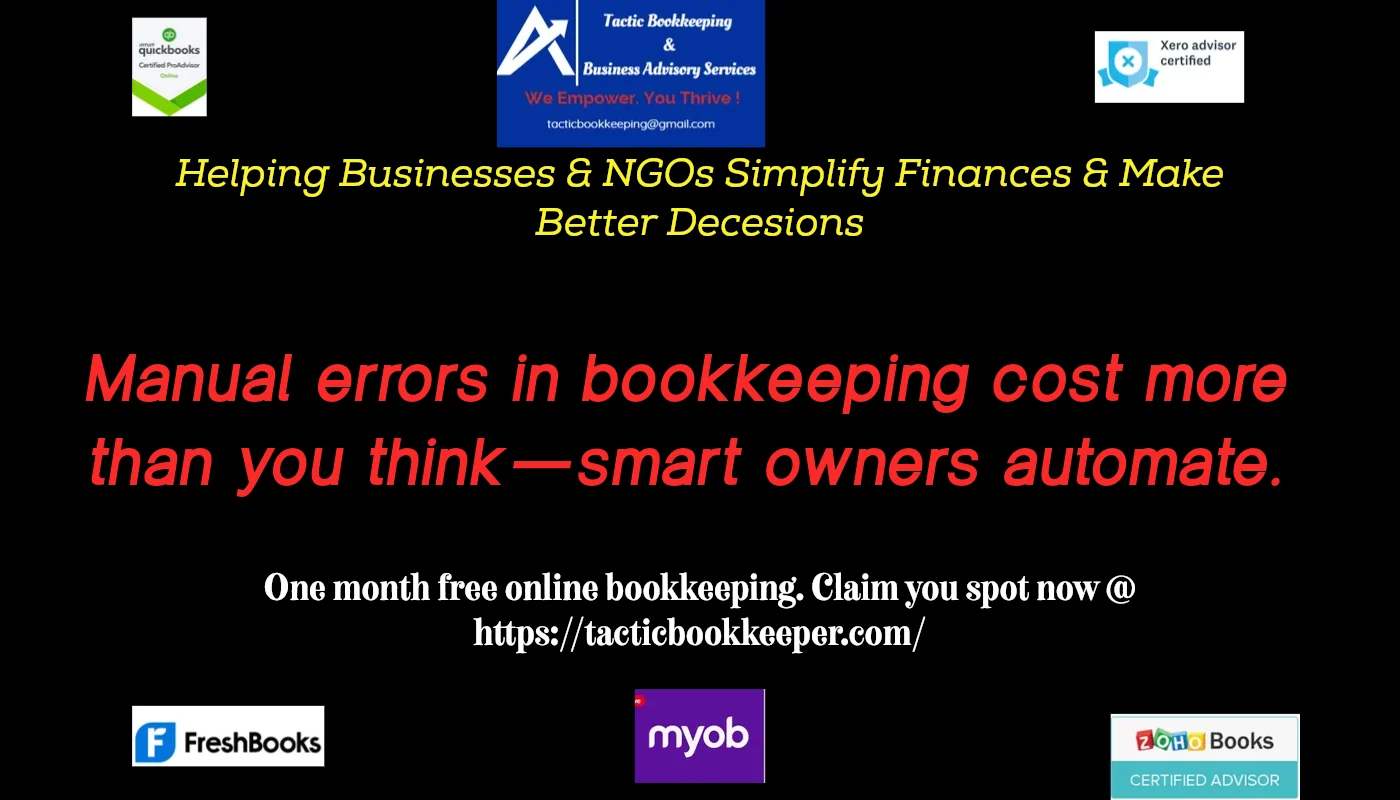Discover what bookkeeping really is and why it’s the heartbeat of your business. Learn how smart financial tracking helps small businesses grow, thrive, and stay stress-free come tax time.
The Coffee Shop That Almost Didn’t Make It
Meet Vanessa.
She opened a cozy coffee shop in downtown Seattle—plants in the window, homemade banana bread, and oat milk lattes that had customers lining up down the block. She was passionate. Creative. A natural entrepreneur.
But six months in, she called us in a panic:
“I think I’m doing okay… but I don’t know where my money is going.”
Vanessa didn’t have a sales problem. She had a bookkeeping problem.
And she’s not alone.
What Is Bookkeeping, Really?
At its core, bookkeeping is the process of tracking and organizing all your business’s financial transactions.
Every sale. Every expense. Every invoice and payment.
Think of it like your business’s GPS system. Without it, you’re just driving in the dark.
Bookkeeping tells you:
- Are you making a profit?
- Can you afford that new hire?
- Who still owes you money?
- How much do you owe in taxes?
Without answers to these questions, every decision becomes a guess. And guesswork? That’s dangerous for any small business.
The Two Pillars of Bookkeeping
1. Recording Transactions
Every time money moves, it gets recorded. That includes:
- Sales
- Expenses
- Payroll
- Loan payments
- Refunds
2. Categorizing Transactions
Organizing your records into categories like rent, supplies, marketing, travel, etc., is what makes your books useful.
Pro tip: Categorization is where most small businesses lose money—by missing deductions or misclassifying expenses.
Wait… Isn’t That What Accounting Is?
Not quite.
| Bookkeeping | Accounting |
| Tracks the money | Analyzes the data |
| Day-to-day transactions | Big-picture strategy |
| Foundational | Advisory |
Bookkeepers count the bricks. Accountants design the house.
You need both—but bookkeeping comes first.
What Happens If You Ignore It?
Let’s go back to Vanessa.
She wasn’t tracking expenses. She accidentally used her business account for groceries. She forgot to invoice a few clients. And she had no idea her cost of goods sold was way too high.
Here’s what ignoring your books can cost you:
- Overpaying on taxes (or getting audited)
- Losing access to funding or grants
- Making costly business decisions
- Sleepless nights from financial uncertainty
Vanessa was lucky. We helped her clean things up. But many small businesses don’t recover.
5 Reasons Bookkeeping Changes Everything
Here’s what happens when your books are in order:
1. You Make Smarter Business Moves
Want to hire? Expand? Raise prices? You can’t do it confidently without real numbers.
2. You Save Big on Taxes
Categorized, accurate records = maximum deductions. Cha-ching.
3. You Get Paid On Time
Know exactly who owes you—and follow up professionally and automatically.
4. You Can Get Loans or Grants
Clean books make you bankable. Lenders love transparency.
5. You Sleep Better at Night
No more guessing. Just clarity and confidence.
DIY vs. Hiring a Pro: What’s Right for You?
Doing It Yourself
Tools like QuickBooks, Xero, or Wave can work if you’re just starting out. But they take time to learn, and mistakes are easy to make.
Risk: You save money upfront… but you could lose way more later.
Hiring a Bookkeeper (That’s Us)
When you work with pros (like Tactic Bookkeeping), you’re not just outsourcing tasks—you’re investing in the health of your business.
We give you:
- Up-to-date books
- Tax-season readiness
- Financial clarity
- Time back to focus on your craft
How Tactic Bookkeeping Helps Small Businesses Thrive
When you partner with us, you’re not just hiring a number-cruncher—you’re gaining a financial teammate who cares about your success.
Our Process:
- Free Discovery Call
We learn about your business, goals, and pain points. - Clean-Up & Setup
We get your books in shape (yes, even if they’re a hot mess). - Ongoing Monthly Bookkeeping
Every dollar tracked. Every report explained in plain English. - Strategic Support
We help you use your numbers—not just file them away.
Real Words from a Real Client (Vanessa):
“I used to think bookkeeping was just paperwork. Now I see it’s what saved my business.”
Ready to Take Control of Your Finances?
Bookkeeping isn’t just an administrative task.
It’s a power move.
Whether you’re a solo freelancer, online store, or growing brick-and-mortar biz, it’s time to stop winging it.
Book your free strategy session with Tactic Bookkeeping today
We’ll give you a custom snapshot of your financial health—and show you where the real opportunities lie.
BONUS: The first 10 businesses to book this month get a Free monthly bookkeeping bundle ($299 value)
FAQ: Quick Answers to Common Questions
1. What’s the difference between bookkeeping and accounting?
Bookkeeping records your financial activity; accounting interprets and advises based on that data.
2. Can I do my bookkeeping myself?
Yes, but you need to stay consistent, organized, and informed on tax rules. Software helps, but errors can cost you more in the long run.
3. How often should I do my bookkeeping?
Ideally weekly or monthly. Waiting until tax season is a recipe for stress and missed deductions.
4. How much does bookkeeping cost for a small business?
It depends on your complexity. Many small businesses pay between $200–$1500/month. (And we offer custom packages!)
5. Can you clean up past months or years of messy books?
Absolutely. We love a good clean-up project—and we never judge.
We Want to Hear From You!
What part of small business finances stresses you out the most?
What topics do you wish someone would just explain like a human being?
Drop your topic requests in the comments!
We might feature yours in our next blog post.
Final Word: Your Numbers Deserve Attention
You’ve worked too hard to fly blind.
Let us help you see clearly.
📞 Book your free session — Let’s take the mystery (and misery) out of your money.

